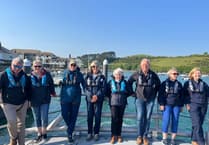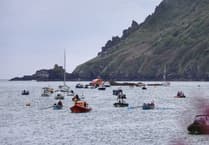A diver was airlifted from Salcombe to Derriford on Saturday afternoon, where he was pronounced dead.
The man, who was diving off the coast of Salcombe, was airlifted to hospital after being struck down with suspected decompression sickness, known as ‘the bends’, but he was confirmed dead on arrival.
Salcombe RNLI and the Maritime and Coastguard Agency both attended after a mayday call was received shortly after 2pm on Saturday, June 17.
A spokesman for Kingsbridge Police posted on Facebook saying: “A male has tragically died this afternoon after diving off the Salcombe coast.
“Salcombe RNLI attended and the male was airlifted to Derriford Hospital but was pronounced deceased by Doctors. An investigation is under way by Police to establish the cause of his death and a file is being prepared for HM Coroner.
“Our sincere condolences go out to all of the family and friends of the gentleman.”
David Dancox, Salcombe RNLI, said: “Following a Mayday call, RNLI Salcombe’s all-weather lifeboat launched to reports of an unconscious diver aboard a diving vessel, some 37 miles south of Prawle Point.
“Whilst on route the ALB was informed that the Coastguard Rescue Helicopter had winched the casualty off the vessel and was transferring him to Derriford Hospital.
“Coastguard requested the ALB continue to the diving vessel to check on the welfare of the crew still on-board and the remaining divers, who at that point were still surfacing.
“Once all crew and divers were aboard and with two members of the RNLI crew remaining on-board, to monitor their condition the vessel was escorted back to Salcombe Harbour arriving at 7pm.
“RNLI Salcombe send their sincere condolences to the family and friends of the deceased diver.”
Decompression sickness can affect scuba divers, as well as aviators and astronauts, and is usually linked to rapid ascents to the surface with inadequate decompression.
The Divers Alert Network says: “During a dive, the body tissues absorb nitrogen from the breathing gas in proportion to the surrounding pressure. As long as the diver remains at pressure, the gas presents no problem.
“If the pressure is reduced too quickly, however, the nitrogen comes out of solution and forms bubbles in the tissues and bloodstream. This commonly occurs as a result of violating or approaching too closely the diving table limits, but it can also occur even when accepted guidelines have been followed.
“Bubbles forming in or near joints are the presumed cause of the joint pain of a classical "bend." When high levels of bubbles occur, complex reactions can take place in the body, usually in the spinal cord or brain. Numbness, paralysis and disorders of higher cerebral function may result.
“If great amounts of decompression are missed and large numbers of bubbles enter the venous bloodstream, congestive symptoms in the lung and circulatory shock can then occur.”





Comments
This article has no comments yet. Be the first to leave a comment.